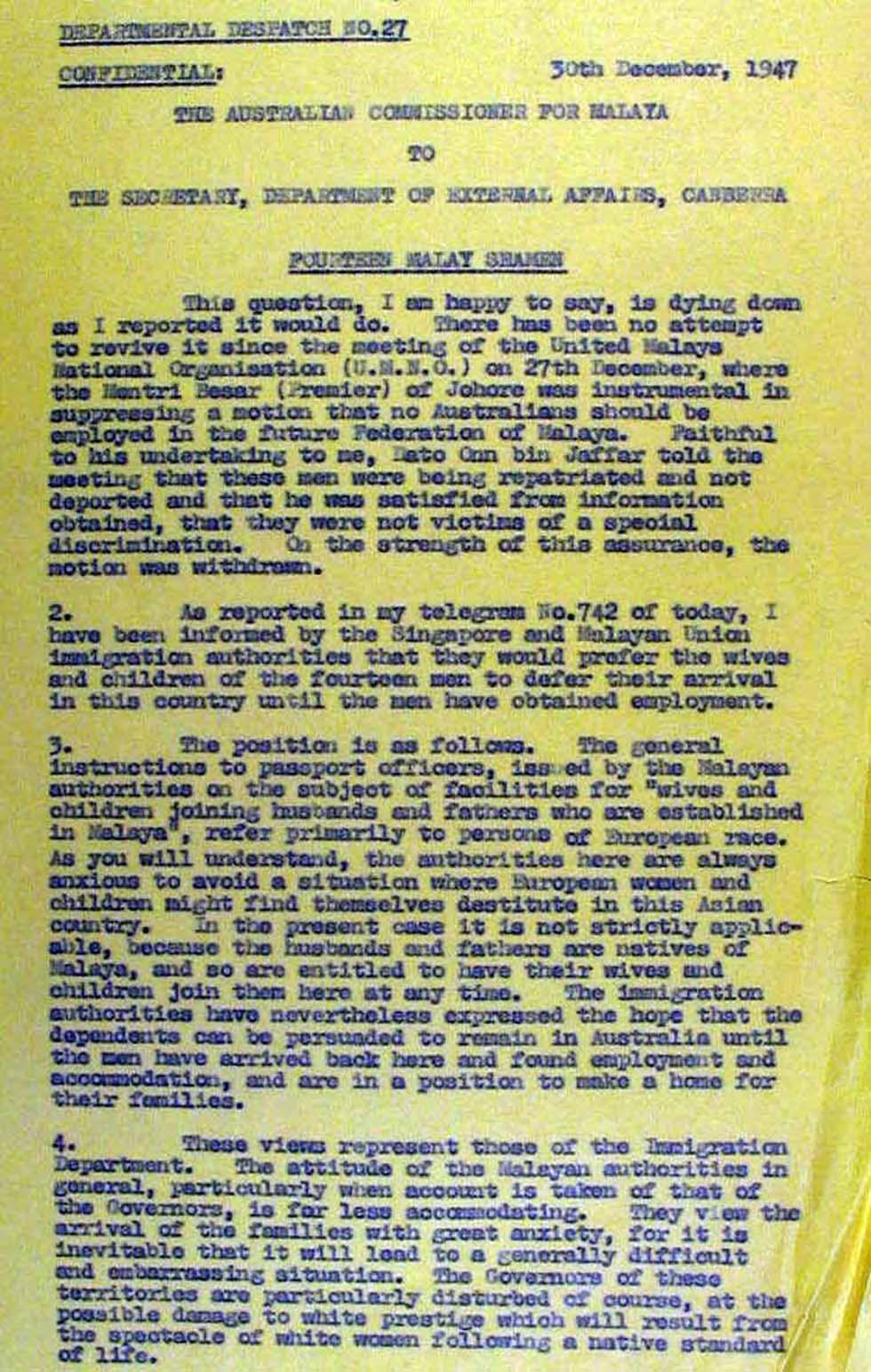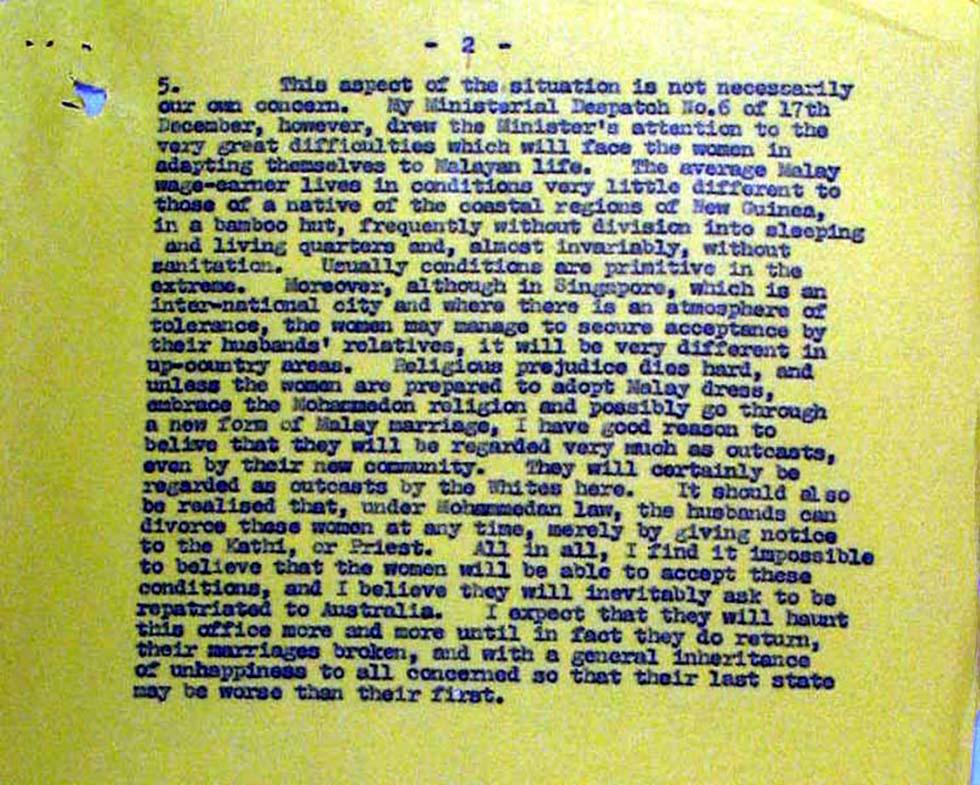
Confidential despatch from the Australian Commissioner for Malaya to Secretary, Department of External Affairs.

Confidential despatch from the Australian Commissioner for Malaya to Secretary, Department of External Affairs.
Aboriginal and Torres Strait Islander people should be aware that the National Archives' website and collection contain the names, images and voices of people who have died.
Some records include terms and views that are not appropriate today. They reflect the period in which they were created and are not the views of the National Archives.


Confidential despatch from the Australian Commissioner for Malaya to Secretary, Department of External Affairs.

Confidential despatch from the Australian Commissioner for Malaya to Secretary, Department of External Affairs.
[page 1]
[underlined] DEPARTMENTAL DISPATCH NO.27
CONFIDENTIAL: [end underlined]
30th December, 1947
THE AUSTRALIAN COMMISSIONER FOR MALAYA
TO
THE SECRETARY, DEPARTMENT OF EXTERNAL AFFAIRS, CANBERRA
[underlined] FOURTEEN MALAY SEAMEN [end underlined]
This question, I am happy to say, is dying down as I reported it would do. There has been no attempt to revive it since the meeting of the United Malays National Organisation (U.M.N.O) on 27th December, where the Menteri Besar (Premier) of Johore was instrumental in suppressing a motion that no Australians should be employed in the future Federation of Malaya. Faithful to his undertaking to me, Dato Onn bin Jaffar [sic] told the meeting that these men were being repatriated and not deported and that he was satisfied from information obtained, that they were not victims of a special discrimination. On the strength of this assurance, the motion was withdrawn.
2. As reported in my telegram No.742 of today, I have been informed by the Singapore and Malayan Union immigration authorities that they would prefer the wives and children of the fourteen men to defer their arrival in this country until the men have obtained employment.
3. The position is as follows. The general instructions to passport officers, issued by the Malayan authorities on the subject of facilities for “wives and children joining husbands and fathers who are established in Malaya”, refer primarily to persons of European race. As you will understand, the authorities here are always anxious to avoid a situation where European women and children might find themselves destitute in this Asian country. In the present case it is not strictly applicable, because the husbands and fathers are natives of Malaya, and so are entitled to have their wives and children join them here at any time. The immigration authorities have nevertheless expressed the hope that the dependents can be persuaded to remain in Australia until the men have arrived back here and found employment and accommodation, and are in a position to make a home for their families.
4. These views represent those of the Immigration Department. The attitude of the Malayan authorities in general, particularly when account is taken of that of the Governors, is far less accommodating. They view the arrival of the families with great anxiety, for it is inevitable that it will lead to a generally difficult and embarrassing situation. The Governors of these territories are particularly disturbed of course, at the possible damage to white prestige which will result from the spectacle of white women following a native standard of life.
[end page 1]
[page 2]
- 2 -
5. This aspect of the situation is not necessarily our own concern. My Ministerial Dispatch No.6 of 17th December, however, drew the Minister’s attention to the very great difficulties which will face the women in adapting themselves to Malayan life. The average Malay wage-earner lives in conditions very little different to those of a native of coastal regions of New Guinea, in a bamboo hut, frequently without division into sleeping and living quarters and, almost invariably, without sanitation. Usually conditions are primitive in the extreme. Moreover, although in Singapore, which is an inter-national city and where there is an atmosphere of tolerance, the women may manage to secure acceptance by their husbands’ relatives, it will be very different in up-country areas. Religious prejudice dies hard, and unless the women are prepared to adopt Malay dress, embrace the Mohammedan religion and possibly go through a new form of Malay marriage, I have good reason to believe that they will be regarded very much as outcasts, even by their new community. They will certainly be regarded as outcasts by the Whites here. It should also be realised that, under Mohammedan law, the husbands can divorce these women at any time, merely by giving notice to the Kathi, or Priest. All in all, I find it impossible to believe that the women will be able to accept these conditions, and I believe they will inevitably ask to be repatriated to Australia. I expect that they will haunt this office more and more until in fact they do return, their marriages broken, and with a general inheritance of unhappiness to all concerned so that their last state may be worse than their first.
Learn how to interpret primary sources, use our collection and more.
